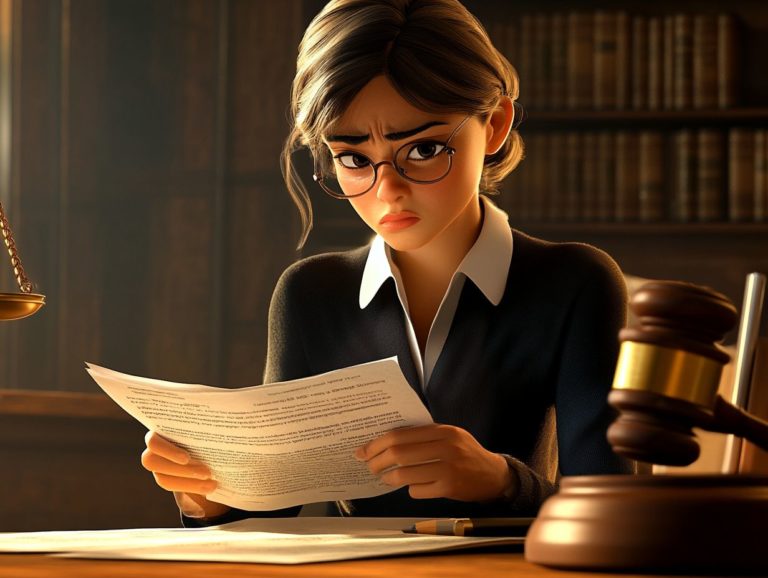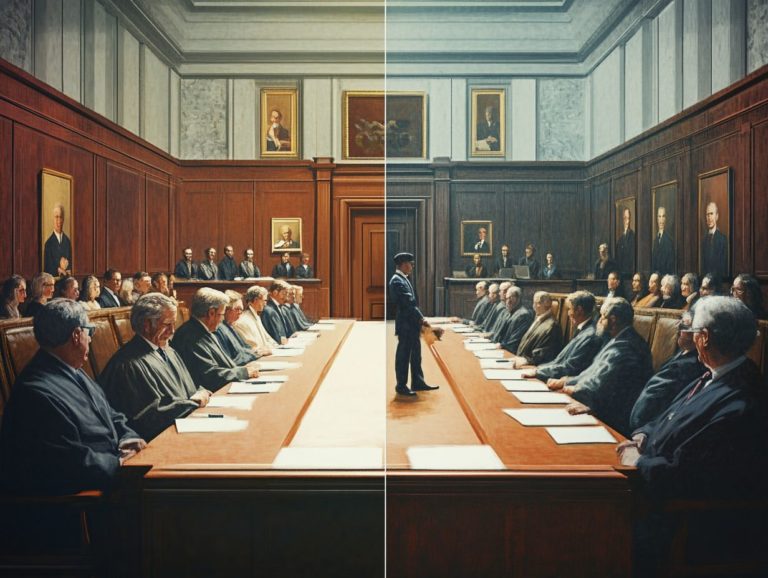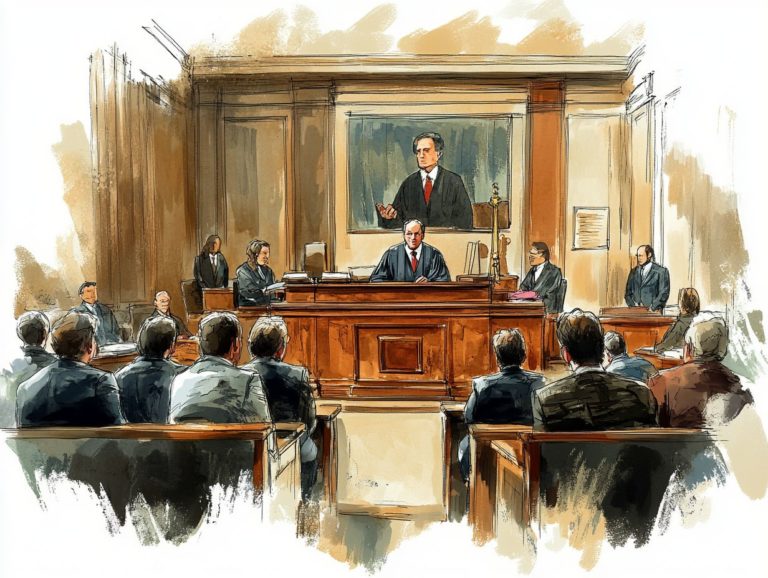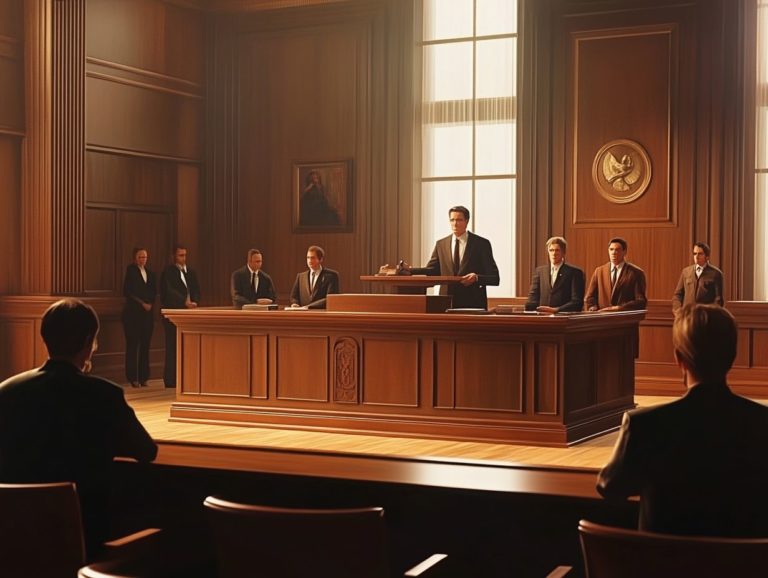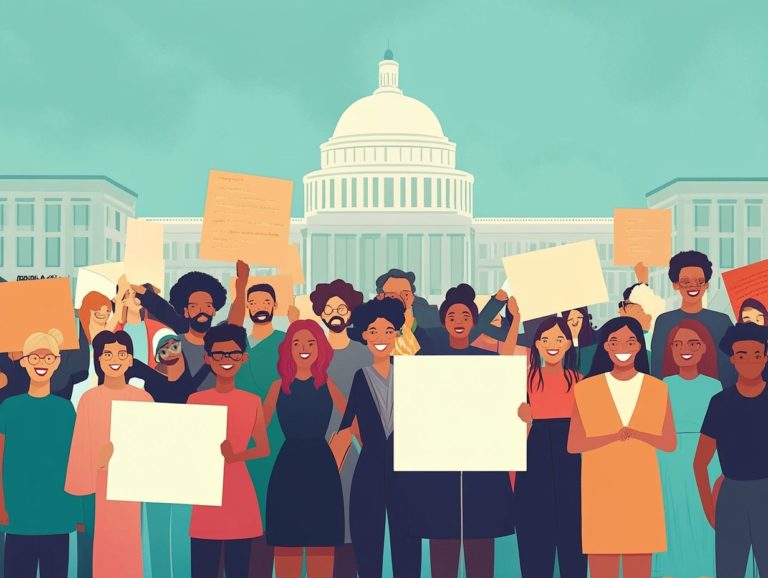The Role of Civil Rights Organizations
Civil rights organizations have played a pivotal role in shaping society by advocating for equality and justice.
From their historical roots to the present day, these groups have driven significant milestones and movements that have transformed the landscape of civil rights. Explore the current state of these organizations and see their vital work in action!
It also examines their impact through inspiring success stories and ongoing challenges while providing insights on how you can get involved.
Discover the essential contributions of civil rights organizations in advancing human dignity and social justice.
Contents
- Key Takeaways:
- The History of Civil Rights Organizations
- Current State of Civil Rights Organizations
- The Role of Civil Rights Organizations
- Impact of Civil Rights Organizations
- How to Get Involved with Civil Rights Organizations
- Frequently Asked Questions
- What is the role of civil rights organizations?
- How do civil rights organizations achieve their goals?
- Why is the role of civil rights organizations important?
- Are civil rights organizations only focused on one specific group?
- How can I get involved with civil rights organizations?
- What can I do if I feel my rights have been violated?
Key Takeaways:
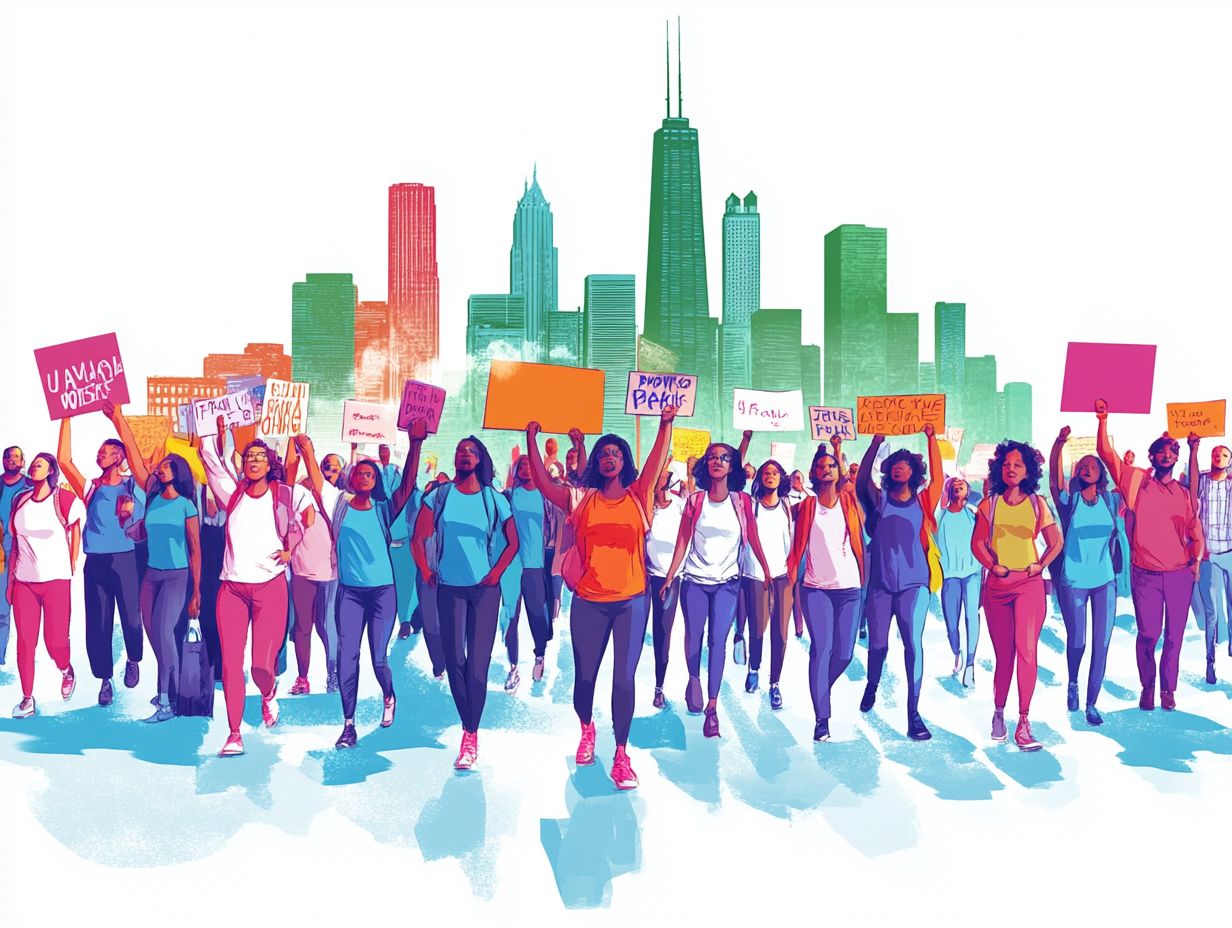
Civil rights organizations have a rich history of fighting for justice and equality, with key milestones like the Civil Rights Movement shaping their work. Today, major organizations continue to advocate for marginalized communities and offer legal support. They also promote education and empowerment within communities.
The impact of civil rights organizations can be seen in successful cases and ongoing challenges. Individuals can get involved by volunteering and donating their time and resources.
The History of Civil Rights Organizations
The history of civil rights organizations in the United States unfolds as a rich tapestry, intricately woven with the struggles of countless individuals and groups dedicated to combating racial discrimination and injustice.
It all began in the early 20th century when organizations like the NAACP emerged as pivotal forces advocating for African American rights and standing against widespread separation and Jim Crow laws.
During the 1960s civil rights movement, these organizations were crucial players in legislative battles for voting rights and racial equality, often confronting violent opposition.
This ongoing fight for social justice is deeply rooted in the legacies of influential figures like W. E. B. Du Bois, who tirelessly championed the cause of African Americans.
Game-Changing Moments in the Civil Rights Movement
Key milestones in the civil rights movement encompass landmark events and significant legislative acts that reshaped racial equality in America.
One of the most notable achievements is the Brown v. Board of Education decision, which declared segregation in public schools unconstitutional. This pivotal ruling didn t just dismantle the Jim Crow laws that enforced racial separation; it ignited a wave of activism throughout the nation.
Organizations like the NAACP were essential in galvanizing communities and advocating for justice. In the wake of this ruling, the Civil Rights Act of 1964 emerged as a monumental legislative triumph, prohibiting discrimination across various sectors, including public accommodations and employment.
The 1965 Voting Rights Act further solidified these advancements by eliminating barriers to voting for African Americans, fostering greater political participation.
Collectively, these milestones not only propelled civil rights forward but also inspired ongoing movements for racial justice, motivating generations to persist in the pursuit of equality.
Current State of Civil Rights Organizations
In today s world, civil rights organizations lead the charge in the pursuit of racial and social justice. They tackle persistent issues like systemic racism and economic inequality, which continue to impact marginalized communities.
Their unwavering commitment highlights the urgent need for change and equity in society. Join us in advocating for justice and equality your voice matters!
Major Organizations and Their Work
Among the major civil rights organizations, the NAACP, American Civil Liberties Union, Southern Christian Leadership Conference, and Black Panther Party have each played a crucial role in the ongoing pursuit of racial equality and justice throughout history.
With a rich tapestry of activism and legal advocacy, each organization has carved out a unique niche in the fight for civil rights.
The NAACP, founded in 1909, has focused on dismantling systemic racism through strategic legal challenges. They have famously targeted segregation laws and influenced landmark cases like Brown v. Board of Education.
Meanwhile, the American Civil Liberties Union has stood as a staunch defender of individual freedoms, tackling critical issues such as voting rights and free speech while engaging in robust legal battles that have shaped public policies.
The Southern Christian Leadership Conference, established by Dr. Martin Luther King Jr., emphasized nonviolent protest as a powerful vehicle for change. In contrast, the Black Panther Party advocated for community enablement by addressing fundamental needs like health care and education.
Together, their collective efforts have driven significant legislative advancements and heightened public awareness of civil rights, marking pivotal moments that have shaped American history.
The Role of Civil Rights Organizations
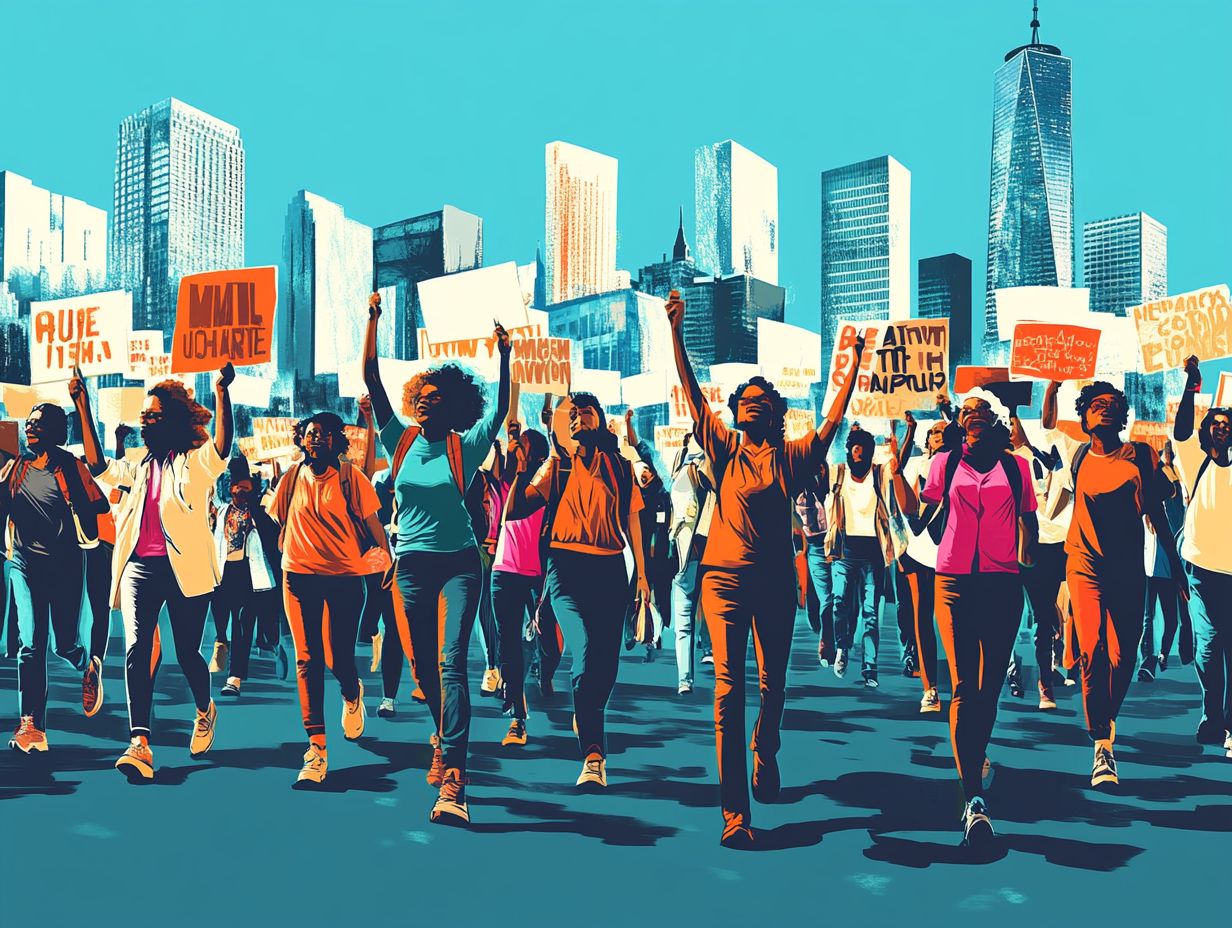
Civil rights organizations take on many important roles in championing racial justice. They take action, offer vital legal support, and promote community education and empowerment for marginalized groups.
Their efforts are essential in creating a more equitable society.
Advocacy and Activism
Advocacy and activism lie at the heart of civil rights organizations, which passionately launch public protests and campaigns to champion racial justice and foster social change.
In these efforts, these organizations deploy a wide array of strategies that resonate deeply with diverse communities striving for equality. Grassroots mobilization takes center stage, enabling local activists to rally individuals around shared causes, effectively amplifying their voices against systemic injustices.
Public demonstrations emerge as potent tools, vividly highlighting the urgency of pressing issues like police brutality and voter suppression. Movements such as Black Lives Matter have recently sparked global protests, forging alliances with environmental and gender equality advocates, thereby emphasizing the interconnectedness of various social movements.
These collaborative efforts are vital as civil rights activism evolves to meet today’s challenges.
Legal Support and Representation
Legal support and representation offered by civil rights organizations are crucial in the fight against racial discrimination, ensuring that victims of injustice can access the legal resources they require.
These organizations go beyond merely representing individuals in court; they tirelessly advocate for systemic changes that foster equality and justice for everyone. Their initiatives involve challenging discriminatory laws, mobilizing community support, and pushing for policies that enhance civil rights protections.
Noteworthy cases, such as the landmark ruling in Brown v. Board of Education, highlight the profound influence these organizations have had on transforming societal norms and advancing justice.
Through their unwavering commitment, they achieve victories that resonate throughout communities, securing not just legal triumphs but also instilling hope and empowerment for future generations.
In summary, civil rights organizations play an indispensable role in advocating for justice and equality. Their ongoing work continues to impact society and inspire future generations to stand up for their rights. Join the fight for justice and equality by supporting local civil rights organizations.
Community Education and Empowerment
Community education and empowerment initiatives led by civil rights organizations are pivotal for raising awareness about issues related to racial justice and fostering grassroots engagement.
Through a variety of educational programs and workshops, these organizations equip you with invaluable resources to understand your rights and understand the law, while honing your advocacy skills.
You ll gain insights into the historical context of civil rights. This knowledge enables you to connect past struggles with the contemporary challenges you face today.
These initiatives often feature engaging discussions, insightful guest speakers, and interactive activities that promote collective brainstorming and active participation.
As a result, you and your community transform from passive observers into active agents of change. You cultivate a more informed public ready to confront social justice issues head-on.
Impact of Civil Rights Organizations
The profound impact of civil rights organizations is reflected in numerous success stories that highlight their transformative role in advancing racial justice.
While celebrating these achievements, it’s essential to acknowledge the persistent challenges they continue to confront in their mission.
Success Stories and Ongoing Challenges
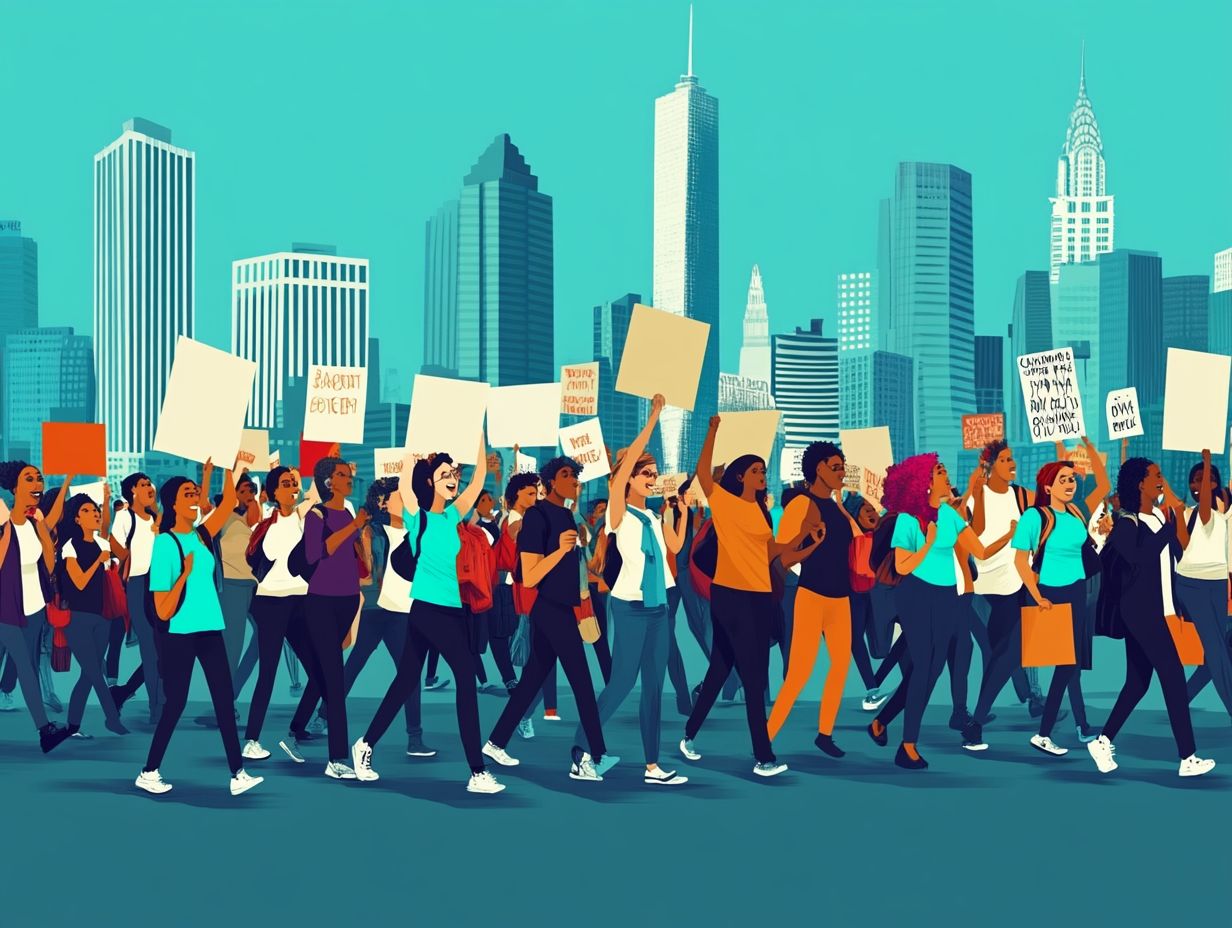
Success stories from civil rights organizations highlight the strides made in racial justice. Yet, ongoing challenges reveal persistent issues that require your continued attention and action.
Take, for instance, the initiatives led by groups like the NAACP and the ACLU. They have achieved groundbreaking victories, such as restoring voting rights for millions and dismantling unjust policing practices. These milestones serve as powerful reminders of what organized advocacy and community mobilization can accomplish.
However, the struggle is far from over. Systemic racism continues to manifest, evident in disparities in education, employment, and healthcare access. Ongoing activism is essential to address these inequities and amplify the voices of those who remain marginalized in society.
The fight for equality demands your unwavering commitment and innovative strategies. Together, we can confront these deep-rooted challenges and ensure that the hard-won progress is acknowledged and sustained.
How to Get Involved with Civil Rights Organizations
Engaging with civil rights organizations offers a meaningful opportunity to contribute to the ongoing pursuit of racial and social justice.
Whether through volunteering your time, donating resources, or participating in activism, you can play a vital role in this important movement.
Volunteering and Donating Opportunities
Volunteering and donating to civil rights organizations provide you with a powerful avenue to support their initiatives and contribute to the advancement of racial justice within your community.
By immersing yourself in various volunteer opportunities, you can actively engage in grassroots campaigns, assist in organizing educational workshops, and help mobilize community events.
Many organizations welcome volunteers who are passionate about addressing systemic inequalities. Your donations are crucial, providing essential funding for advocacy efforts, legal services, and outreach programs that amplify marginalized voices.
Get involved in your community to create real change and feel a sense of belonging! Witness firsthand the impact of your contributions. This experience can inspire others to join the important cause for equality and justice.
Frequently Asked Questions
What is the role of civil rights organizations?
The role of civil rights organizations is to advocate for and protect the rights of marginalized and discriminated individuals or groups. This includes working towards equality, justice, and fair treatment for all individuals, regardless of race, gender, religion, or other factors.
How do civil rights organizations achieve their goals?
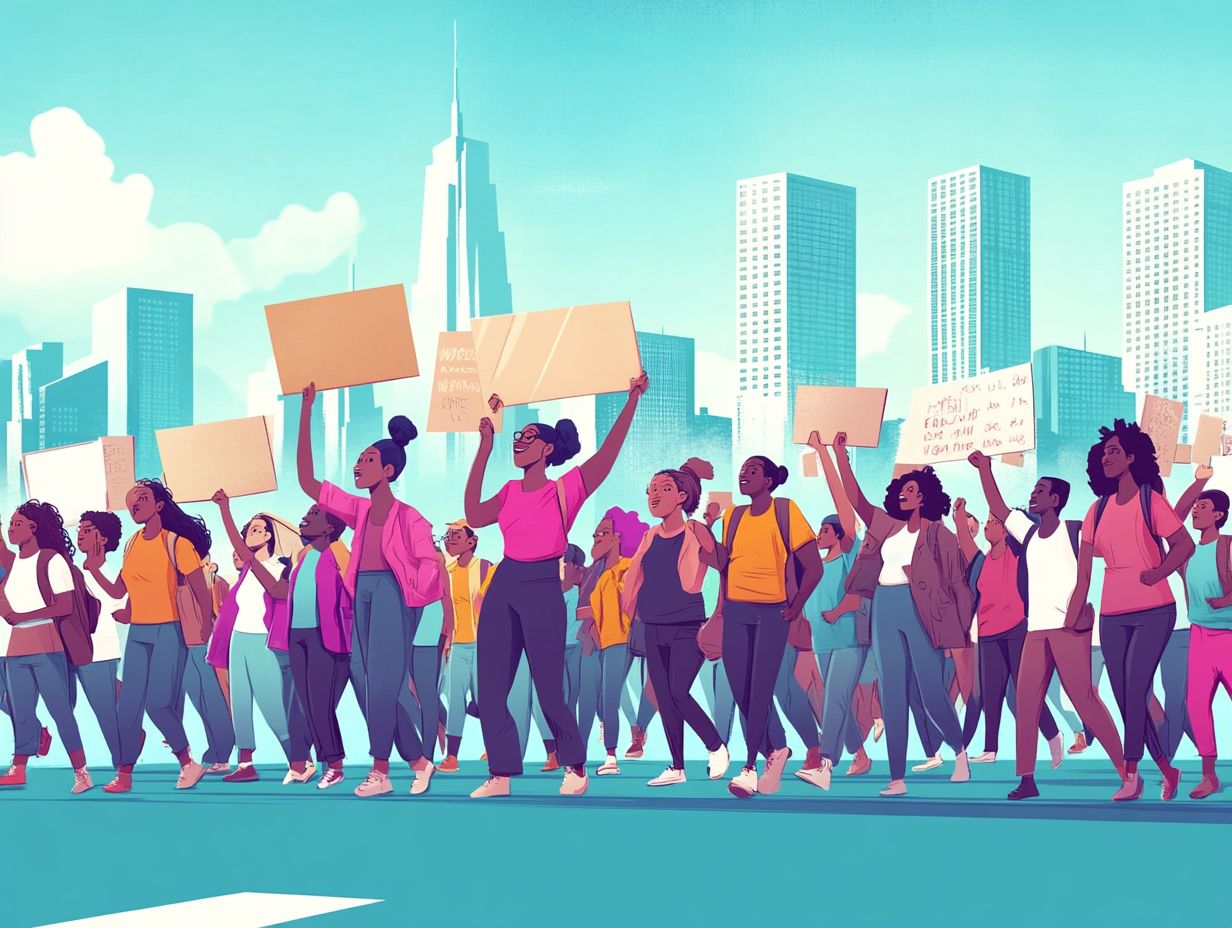
Civil rights organizations use various tactics to achieve their goals. These include lobbying, public education campaigns, and legal action.
They work closely with communities impacted by discrimination. This empowers individuals to advocate for their rights.
Why is the role of civil rights organizations important?
The role of civil rights organizations is crucial for ensuring everyone’s basic rights are respected. They fight unfair laws and promote inclusivity and diversity.
Are civil rights organizations only focused on one specific group?
No, civil rights organizations protect the rights of all marginalized individuals. Their ultimate goal is to promote equality and fair treatment for everyone.
How can I get involved with civil rights organizations?
You can actively support civil rights organizations in several exciting ways! Volunteer, donate, attend events, and advocate for change.
Educate yourself on current issues and support businesses aligned with your values. Now is the time to make your voice heard!
What can I do if I feel my rights have been violated?
If you feel your rights have been violated, reach out to a civil rights organization for support. They can provide resources and advocacy to help you fight against discrimination.
It s important to speak up and seek help when you face unfair treatment.

